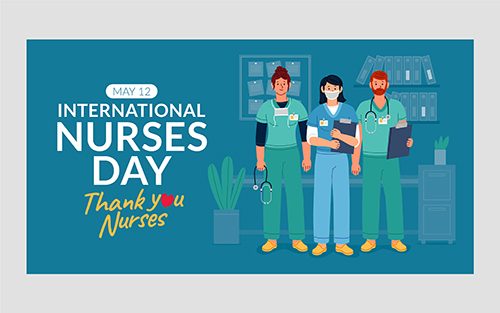Every year on May 12th, the world comes together to celebrate International Nurses Day, a day dedicated to recognizing the invaluable contributions of nurses to our healthcare systems. In Canada, this day holds particular significance as we honour the dedication, compassion, and expertise of nursing professionals, especially against the backdrop of ongoing challenges in healthcare.
Nurses are the backbone of Canada’s healthcare system, providing essential care and support to patients in hospitals, clinics, long-term care facilities, and communities nationwide. Nurses play a pivotal role in healthcare delivery, from administering medication to comforting patients and their families.
Nursing in Canada: A Pillar of Healthcare Excellence

While no system is perfect, Canada’s healthcare system is renowned globally for its commitment to universal access and quality care. At the heart of this system are the nurses who tirelessly serve their communities, providing essential care and support to patients in hospitals, clinics, long-term care facilities, and beyond. Nurses play a pivotal role in healthcare delivery, from administering medication to comforting patients and their families.
In every province, nurses are the backbone of the healthcare workforce, facing unique challenges and opportunities shaped by the local healthcare landscape. In Alberta, for instance, nurses navigate a dynamic healthcare environment characterized by a growing population and evolving healthcare needs. Meanwhile, in Manitoba and New Brunswick, nurses work tirelessly to address healthcare disparities and ensure equitable access to care for all residents.
Recognizing the Role of Medical Office Assistants
While nurses often take center stage in discussions about healthcare, it’s essential to recognize the crucial role played by support workers such as Medical Office Assistants (MOAs). These dedicated professionals work alongside nurses and other healthcare providers, ensuring the smooth operation of healthcare facilities and facilitating seamless patient experiences.
MOAs and unit clerks contribute significantly to the efficiency and effectiveness of healthcare delivery. From managing appointments and medical records to providing administrative support, MOAs are instrumental in enabling nurses to focus on delivering high-quality patient care.
The State of Healthcare: Challenges and Opportunities

As we celebrate International Nurses Day, it’s also essential to reflect on the state of healthcare across Canada. Many provinces face pressing challenges such as healthcare funding constraints, workforce shortages, and increasing services demand. Political interference is another factor which may cause additional strain, particularly in Alberta.
In response to the overburdened healthcare system, UCP leader Danielle Smith pushed for individuals to pay out of pocket for healthcare. Public backlash quickly led to assurances that “No Albertan will ever pay for a doctor out of pocket”. Despite the backpedal, Smith continues working to dismantle Alberta’s healthcare system. The UCP is also pushing bills that restrict federal funding across all sectors.
Amidst these challenges lie opportunities for innovation, collaboration, and improvement. By investing in nursing education and professional development, enhancing interdisciplinary collaboration, and prioritizing patient-centered care, provinces can pave the way for a brighter future for healthcare in Canada.
Addressing Healthcare Challenges: The Aftermath of COVID-19
The COVID-19 pandemic cast a spotlight on the resilience and dedication of healthcare professionals across the globe, including nurses and support workers. As frontline workers, nurses were at the forefront of the pandemic response, caring for patients infected with the virus, administering treatments, and providing vital support to their communities.
Nurses faced unprecedented challenges throughout the pandemic, from managing surges in COVID-19 cases to navigating resource constraints and implementing infection control measures. Despite these challenges, nurses demonstrated remarkable adaptability and resourcefulness, showcasing the true essence of their profession.
Looking to the Future: Advancing Nursing Education and Practice

As we celebrate nurses’ past achievements and present contributions in Canada, it’s crucial to look toward the future of nursing education and practice. Investing in the education and training of the next generation of nurses is essential to ensuring a sustainable healthcare workforce capable of meeting the evolving needs of Canadian communities.
Efforts to expand nursing education programs, enhance clinical training opportunities, and promote lifelong learning among nursing professionals are paramount. By fostering a culture of continuous learning and professional development, we can empower nurses to excel in their roles and drive positive change within the healthcare system.
Diversity and Equality: Core Values for Compassionate Care
Initiatives to promote diversity, equity, and inclusion within the nursing profession are essential for ensuring that all members of the community receive culturally sensitive and responsive care. Unconstitutional and discriminatory policies pose a huge threat to these ideals and must be condemned like the cancer they are.
“Those who deny freedom to others deserve it not for themselves” – Abraham Lincoln
By embracing diversity and valuing the unique perspectives and experiences of nurses from diverse backgrounds, we can foster a more inclusive healthcare environment that meets the needs of all Canadians.
Conclusion: Honoring Our Healthcare Heroes

On International Nurses Day, let us take a moment to express our gratitude to the nurses and support workers who dedicate their lives to caring for others. Across Canada and worldwide, these healthcare heroes embody compassion, resilience, and excellence in every aspect of their work. As we celebrate their contributions, let us also commit to supporting and advocating for the continued advancement of nursing and healthcare in Canada.
If you’re looking to enter the healthcare field yourself as a support worker, check out ABM College’s array of diploma and certificate programs. Or read more industry-relevant blogs here.
About The Author

Content Editor & Writer, ABM College
As Content Editor at ABM College in Calgary, Alberta, Stephen plays a key role in advancing the college’s mission to provide relevant, high-quality training for today’s job market. He ensures all blog articles and web materials are accurate, clear, and genuinely useful for students, career changers, and industry professionals.
Stephen is also the author of a best-selling historical reference series documenting decades of computer and video gaming history — a body of work recognized by the Canadian Choice Awards.
Connect with Stephen on LinkedIn, explore his published works at Falcon Designs, or see his editorial expertise in action on the ABM College Blog.
